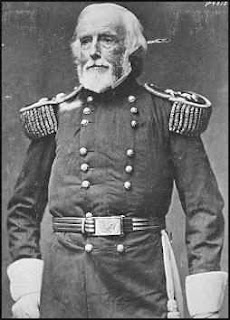As Virginia prepared for war, Col. Joseph K. Mansfield, Commander of the District of Washington, looked across the Potomac with worry. Washington felt vulnerable to him, even with the arrival of thousands of Union volunteers from across the North. Mansfield, a 58 year-old Army Regular, expressed his concern to General-in-Chief Winfield Scott on May 3, 1861:
We now come to the city and Georgetown and arsenal, exposed to the Virginia shore. Here I must remark that the President's House and Department buildings in its vicinity are but two and a half miles across the river from Arlington high ground, where a battery of bombs and heavy guns, if established, could destroy the city with comparatively a small force after destroying the bridges. The Capitol is only three and a half miles from the same height at Arlington, and at the Aqueduct the summits of the heights on the opposite shore are not over one mile from Georgetown.
 |
| Joseph K. Mansfield (courtesy of Wikipedia) |
With this view of the condition of our position, it is clear to my mind that the city is liable to be bombarded at the will of an enemy, unless we occupy the ground which he certainly would occupy if he had any such intention. I therefore recommend that the heights above mentioned be seized and secured by at least two strong redoubts, one commanding the Long Bridge and the other the Aqueduct, and that a body of men be there encamped to sustain the redoubts and give battle to the enemy if necessary. I have engineers maturing plans and reconnoitering further. It is quite probable that our troops assembled at Arlington would create much excitement in Virginia, yet, at the same time, if the enemy were to occupy the ground there a greater excitement would take place on our side, and it might be necessary to fight a battle to disadvantage.Mansfield was unsure of the optimal timing for the movement:
I know not exactly how many troops we have at command. I presume the enemy might bring 10,000 troops into the field in a short time on such an occasion. I would not urge any premature movement in this quarter, yet one taken too late might cause much bloodshed.Although the Union Army did not act immediately on Mansfield's suggestion, an action-forcing event was fast approaching. In a little over two weeks, on May 23, Virginians would head to the polls to vote on the Ordinance of Secession.
2 comments:
Excelllent...........You makes me feel as if I'm living in that time period. Finally getting some decent weather in Mich.
Thanks. Glad you liked the post. I am always trying to bring things to life for the modern reader, wherever possible. Nice weather here too, all the better since today was the 150th anniversary reenactment of the Virginia secession vote in Vienna, VA.
Post a Comment